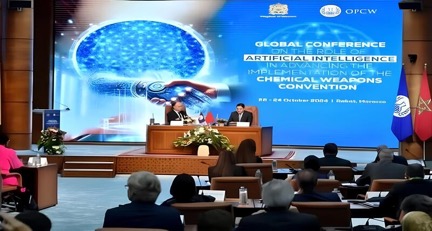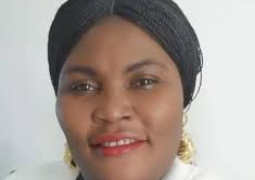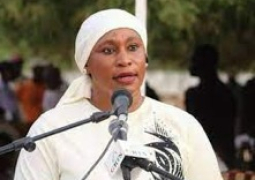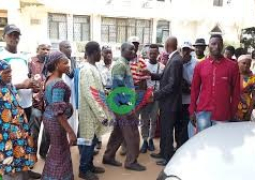
This event, co-chaired today by Morocco’s Minister of Foreign Affairs, African Cooperation and Moroccan Expatriates, Nasser Bourita and OPCW’s Director-General, Fernando Arias, gathers more than 140 foreign participants, including representatives from 40 states-parties to the CWC, as well as international experts from the fields of science, industry, civil society and academics. The Conference provides a platform for exchange and to examine the challenges and opportunities presented by AI in terms of disarmament and chemical security.
Speaking at the opening ceremony, Minister of Foreign Affairs, African Cooperation and Moroccan Expatriates, Nasser Bourita, reaffirmed Morocco’s continued commitment to governing new emerging technologies within the multilateral framework, inspired by King Mohammed VI’s Vision and Guidelines, calling for “accompanying, adapting to and contributing to the innovations of the permanent technological revolution.”
Bourita stressed also that hosting this event reflects the forward-looking vision of Morocco and the OPCW to address the challenges and discuss the opportunities that AI presents for the Convention and its States-Parties.
In this respect, he stated that Morocco’s commitment to hosting this conference is based around four main objectives: to deepen talks on the new dimensions of multilateral disarmament, to strengthen collective understanding of the challenges posed by the use of AI, to identify opportunities to strengthen key provisions of the Convention through AI, and to contribute to international efforts to achieve the Sustainable Development Goals (SDGs) by using the capabilities of AI to promote the peaceful use of chemistry.
As part of his concrete proposals, the Minister highlighted the crucial potential of AI to enhance transparency and mutual trust between States-Parties to the Convention. He stressed that AI, by improving verification and cooperation mechanisms, can play a decisive role in optimizing reporting and data analysis processes, noting that these technological advances would consolidate the provisions of the CWC, while ensuring that AI is used exclusively for peaceful purposes.
Bourita also proposed to endow the Advisory Scientific Committee with additional resources to enable it to further explore the potential of AI, thereby strengthening the commitment of States Parties to the provisions of the Convention. “This would help to ensure that AI does not widen the gap between developed and developing States, but rather is a lever for equitable participation in non-proliferation efforts,” the Minister stressed.
He pointed out that Morocco’s approach to AI revolves around its responsible and ethical use, while maintaining a balance between necessary regulation and innovation, thus guaranteeing the protection of privacy, respect for cultural diversity and ethical use of AI.
The Minister also highlighted the critical challenges of technological divide and the environmental impact of developing AI infrastructure, stressing the importance of overcoming these obstacles, particularly in Africa, where 60% of the population still has no access to the Internet and less than 2% of the data used in AI is located on the continent.
In this respect, he emphasized the importance of international cooperation, focusing on South-South, North-South and triangular partnerships to promote AI capacities in developing countries, stressing the need for effective cooperation to bridge the digital divide and prevent AI from contributing to exacerbating the environmental injustices weighing on developing countries.
He added that effective international cooperation would ensure that AI is a tool for global peace and security, while helping to bridge the technological divide that particularly affects developing countries.
For his part, OPCW Director General Fernando Arias praised in a speech delivered on this occasion, “the vision” and “initiative” of the Kingdom of Morocco for hosting this Global Conference and its role in implementing the Chemical Weapons Convention (CWC).
Mr. Arias also expressed his deep “gratitude” to the Kingdom for hosting this “important and timely conference”.
“This event is one of the most important co-organized by the OPCW outside its headquarters in The Hague,” he said, praising Morocco’s efforts to host this “world-class conference”, with the participation of a large number of leading experts.
The OPCW DG further noted that this major event, which will “undoubtedly be a great success”, aims to explore the implications of AI in “our common mission to eradicate chemical weapons worldwide”.
The aim, he explained, is to better understand and grasp the benefits and risks of AI on the implementation of the Convention and how the OPCW should respond to them.
Morocco has established itself as a major player in AI governance at international level. As the first African and Arab country to implement the UNESCO Recommendation on the Ethics of AI, the Kingdom also co-sponsored the first UN resolutions on AI and launched, in partnership with the United States, the “Group of Friends on Artificial Intelligence for Sustainable Development.” This group aims to mobilize efforts to accelerate the achievement of the Sustainable Development Goals (SDGs), where AI, allied to chemistry, could play a key role.
The OPCW, established in 1997 to implement the CWC, works towards a world free of chemical weapons. With 193 member states and a 2013 Nobel Peace Prize, the OPCW continues to prevent the re-emergence of chemical weapons and promote the peaceful use of chemistry.




